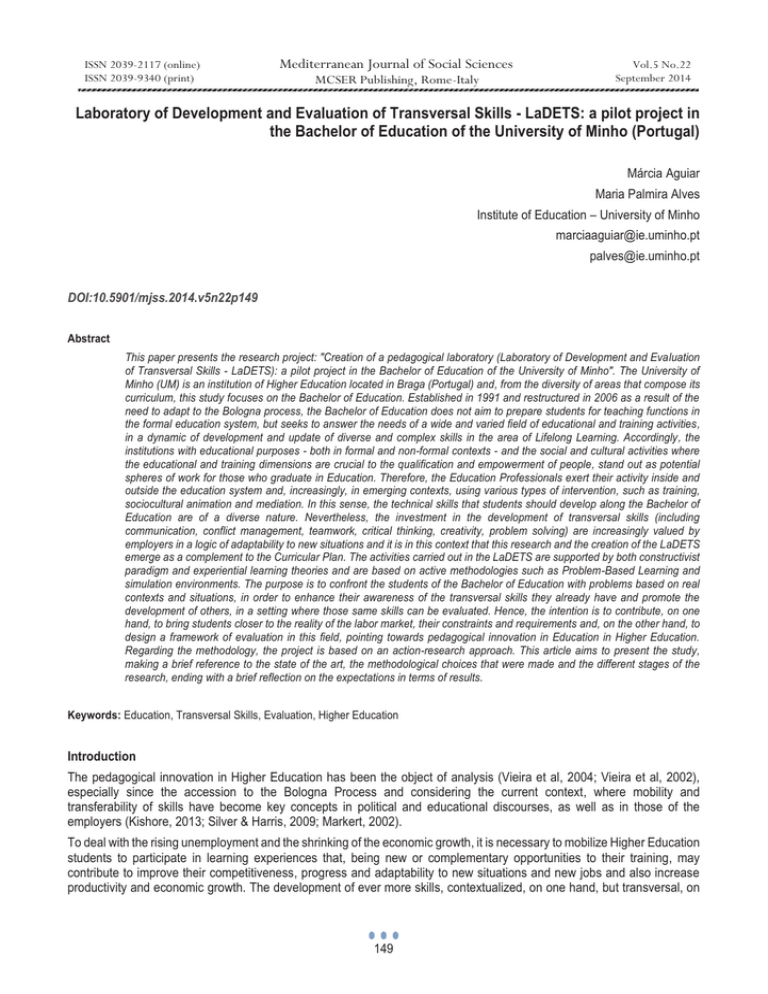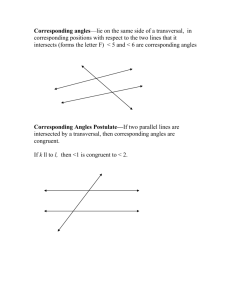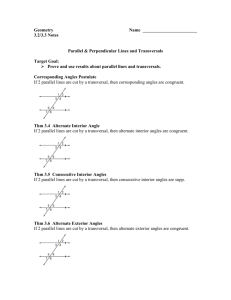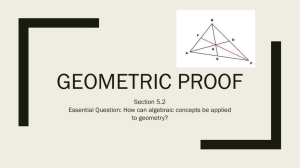Laboratory of Development and Evaluation of Transversal Skills - LaDETS:... the Bachelor of Education of the University of Minho (Portugal)
advertisement

ISSN 2039-2117 (online) ISSN 2039-9340 (print) Mediterranean Journal of Social Sciences MCSER Publishing, Rome-Italy Vol.5 No.22 September 2014 Laboratory of Development and Evaluation of Transversal Skills - LaDETS: a pilot project in the Bachelor of Education of the University of Minho (Portugal) Márcia Aguiar Maria Palmira Alves Institute of Education – University of Minho marciaaguiar@ie.uminho.pt palves@ie.uminho.pt DOI:10.5901/mjss.2014.v5n22p149 Abstract This paper presents the research project: "Creation of a pedagogical laboratory (Laboratory of Development and Evaluation of Transversal Skills - LaDETS): a pilot project in the Bachelor of Education of the University of Minho". The University of Minho (UM) is an institution of Higher Education located in Braga (Portugal) and, from the diversity of areas that compose its curriculum, this study focuses on the Bachelor of Education. Established in 1991 and restructured in 2006 as a result of the need to adapt to the Bologna process, the Bachelor of Education does not aim to prepare students for teaching functions in the formal education system, but seeks to answer the needs of a wide and varied field of educational and training activities, in a dynamic of development and update of diverse and complex skills in the area of Lifelong Learning. Accordingly, the institutions with educational purposes - both in formal and non-formal contexts - and the social and cultural activities where the educational and training dimensions are crucial to the qualification and empowerment of people, stand out as potential spheres of work for those who graduate in Education. Therefore, the Education Professionals exert their activity inside and outside the education system and, increasingly, in emerging contexts, using various types of intervention, such as training, sociocultural animation and mediation. In this sense, the technical skills that students should develop along the Bachelor of Education are of a diverse nature. Nevertheless, the investment in the development of transversal skills (including communication, conflict management, teamwork, critical thinking, creativity, problem solving) are increasingly valued by employers in a logic of adaptability to new situations and it is in this context that this research and the creation of the LaDETS emerge as a complement to the Curricular Plan. The activities carried out in the LaDETS are supported by both constructivist paradigm and experiential learning theories and are based on active methodologies such as Problem-Based Learning and simulation environments. The purpose is to confront the students of the Bachelor of Education with problems based on real contexts and situations, in order to enhance their awareness of the transversal skills they already have and promote the development of others, in a setting where those same skills can be evaluated. Hence, the intention is to contribute, on one hand, to bring students closer to the reality of the labor market, their constraints and requirements and, on the other hand, to design a framework of evaluation in this field, pointing towards pedagogical innovation in Education in Higher Education. Regarding the methodology, the project is based on an action-research approach. This article aims to present the study, making a brief reference to the state of the art, the methodological choices that were made and the different stages of the research, ending with a brief reflection on the expectations in terms of results. Keywords: Education, Transversal Skills, Evaluation, Higher Education Introduction The pedagogical innovation in Higher Education has been the object of analysis (Vieira et al, 2004; Vieira et al, 2002), especially since the accession to the Bologna Process and considering the current context, where mobility and transferability of skills have become key concepts in political and educational discourses, as well as in those of the employers (Kishore, 2013; Silver & Harris, 2009; Markert, 2002). To deal with the rising unemployment and the shrinking of the economic growth, it is necessary to mobilize Higher Education students to participate in learning experiences that, being new or complementary opportunities to their training, may contribute to improve their competitiveness, progress and adaptability to new situations and new jobs and also increase productivity and economic growth. The development of ever more skills, contextualized, on one hand, but transversal, on 149 ISSN 2039-2117 (online) ISSN 2039-9340 (print) Mediterranean Journal of Social Sciences MCSER Publishing, Rome-Italy Vol.5 No.22 September 2014 the other, in a logic of Lifelong Learning, becomes a priority to respond to the constant economic and technological changes we face in contemporary society. The investment in the development and transferability of transversal skills (including communication, conflict management, teamwork, critical thinking, creativity, problem solving), increasingly valued by employers (Kishore, 2013; Silver & Harris, 2009), can facilitate the mobility of individuals in professional terms, broadening their employability horizons, once they become more competitive and able to deal with unforeseen situations. But one of the issues that many authors question (Alves & Machado, 2011; De Ketele 2011, 2008; Tardif & Dubois, 2011; Alves, 2006) is related to the process that involves the evaluation of skills, namely, the transversal ones. Zarifian (1999) defines skill as the practical intelligence headed to situations that are based on the knowledge already acquired, transforming it. It is a “know how to act” (Le Boterf, 2005) that implies knowing how to mobilize capabilities, knowledge and abilities in a given context. In this sense, to evaluate skills, it becomes essential to observe knowledge in action. Thus, in order to promote optimal and innovative conditions for learning that facilitate skills’ training and evaluation, several institutions of Higher Education have already invested in labs and projects that aim the development and evaluation of technical and transversal skills, using active methodologies such as Problem-based Learning (PBL) and simulation environments (Liu & Olson, 2011; Annerstedt, Garza, Huang-DeVoss, Lindh & Rydmark, 2010; Oliveira, 2009; Varga et al., 2009; Santos & Infante-Malachias, 2008; Filho & Romano, 2007). Grounded on a constructivist perspective, the PBL methodology is based on problem situations, from which students reflect, mobilizing different disciplinary knowledge. As a result, this approach stimulates the development, amongst others, of critical thinking, cooperative and independent learning and improves the capacity of decision-making, promoting an overview of the real problems that occur in professional contexts. The objectives of PBL methodology are, therefore, to prepare students for professional practice, through strategies that enhance motivation, teamwork and the development of self-regulatory skills (Biggs, 2003) and, accordingly, the students, working in small groups, are in the center of the process, which is facilitated by a tutor (Fernandes, 2011; Barrows, 1996). In short, PBL is founded on the premises of "learning by doing" and “learning how to learn”, in a multi and interdisciplinary way and contributes to the empowerment of students, by assisting in their preparation to deal with the challenges of contemporary societies (Esteves & Leite, 2005; Savin-Baden, 2000). In fact, given its potential, PBL methodology and simulation environments have been capturing the attention of Higher Education institutions for decades. Having emerged in North America in the 60s, associated to the Health Sciences field, these methodologies have been extended, gradually, to other areas (Barrett & Moore, 2011; Peters, Lazzara & Johnson, 1981; Burke, Benner, Maier & Lewis, 1973; Koeninger & Ward, 1972). Considering, specifically, the object of this study, the University of Minho has been doing an important work in this area, especially in the fields of Health Sciences and Engineering, presenting very positive results (Costa et al, 2013; Fernandes, 2011; Salgueira, Cerqueira, Sousa & Costa, 2009). However, in the Educational Sciences domain, these practices have not been given prominence (Leite & Esteves, 2005; Leite, 2005), except in contexts related to Teacher Education (Leite, Dourado & Morgado, 2011; Esteves & Leite, 2005; Leite, 2005; Leite & Afonso, 2001). With regard, particularly, to the Bachelor of Education, privileged object of analysis in this research, although the development and evaluation of transversal skills are implicitly present in the Curricular Plan itself, these skills are not always perceived and applied by the students in a dialectical relationship between the theory and the practices/professional contexts. In turn, it is not also simple for teachers to evaluate the same skills in action (De Ketele, 2011; Alves, 2006; Rey, Carette, Defrance & Kahn, 2006; Roegiers, 2004). The Bachelor of Education tries to respond to the educational and training needs of the knowledge societies, in a logic of Lifelong Learning and, consequently, the activities of these Professionals are in direct conjunction with the growing complexity of social, cultural and economic life, in its formal, non-formal and informal strands. It is, for that reason, a Course that does not qualify “for teaching functions in the formal education system, but prior to the upgrade of diverse and complex skills in the area of education and training throughout life, which extend well beyond the boundaries of the school system and institutionalized education. It trains, for this reason, professionals or technicians of education oriented to work inside and outside the education system, at all levels and comprising various forms of intervention (education, training, training management, mediation, etc.).” (Curso de Licenciatura em Educação. Proposta de Reestruturação, 2006, p. 8) 150 ISSN 2039-2117 (online) ISSN 2039-9340 (print) Mediterranean Journal of Social Sciences MCSER Publishing, Rome-Italy Vol.5 No.22 September 2014 This breadth and complexity of functions require not only technical preparation, but the development of transversal skills (based on the multidisciplinarity and teamwork that underlie the profession) that stimulate creative and effective problem solving, critical thinking, the efficient management of conflicts, the ability to improvise and to open constructive communication channels, in a cooperative and collaborative dynamic that promotes a praxis related to theory, so that the quality of the professional practices can be strengthened. In this context, this Project is founded on the following research question: “Will the training of transversal skills in a pedagogical and laboratorial environment have a material impact on the articulation between theory and practice in the learning process and on the professional practices of the students of the Bachelor of Education of the University of Minho?” The research has, thus, two general objectives: to promote pedagogical innovation in the field of Education in Higher Education and to build a Laboratory of Development and Evaluation of Transversal Skills (LaDETS) that operates based on simulated environments and Problem-based Learning (PBL) methodologies. Finally, the specific objectives include: to stimulate the development of transversal skills among the students of the Bachelor of Education of the University of Minho, using the PBL methodology and simulated environments; to evaluate the transversal skills developed in LaDETS, through the creation and validation of appropriate instruments to that end; to evaluate the impact of the work accomplished in LaDETS in the learning process of the students or in their professional practices. Method Procedures This research is grounded on a qualitative methodological approach, supported by a constructivist paradigm, centered on the interpretation of the meanings produced by the social actors involved; therefore, the reality is assumed as “a set of socially constructed and negotiated meanings” (Bogdan & Biklen, 1994, p . 54). This relates to the fact that qualitative methodologies emphasize the interpretive understanding of events, as well as the importance of the subjective component of social behavior revealed by the personal experience of the actors who are part of a specific investigation. Another main reason of this prerogative is the search of meaning for the actions constructed by individuals to understand how they behave before a certain movement, fact or social situation, as this is a dimension full of significances. In this sense, the Project seeks to analyze/interpret the reality according to the perspective of the actors and this methodological aspect enables the researchers to develop a privileged interaction with the participants, facilitating the sharing of experiences, meanings and perceptions between themselves and the social actors, within a symbolic interactionism (Albarello et al., 2005; Lessard-Hébert, Goyette & Boutin, 2005; Bogdan & Biklen, 1994; Haguette, 1995; Erasmie & Lima, 1989). The study focuses on an action-research approach, since it allows an active and critical participation of the actors in the construction of their own action, facilitating the real implication and commitment of the participants and culminating in social contracts that offer a collective contribution within the objectives, affiliations, subjectivities, aspirations and identities of each individual in himself (Lessard-Hébert et al, 2005; Haguette, 1995; Erasmie & Lima, 1989). In this context, action-research is considered the most appropriate approach inasmuch as it promotes the partaking of the participants in the analysis and in the pursuit of answers to the problems posed, constituting a means of investigating social and professional situations, aiming the awareness to all the procedures and responses considered important to act in those same situations. Adopting the perspective of Silva and Pinto (2009), action-research is characterized by its complex nature (it has objectives of research, innovation and skills development) and collective (it is based on a collective structure that involves a team of researchers in the process of investigation and intervention). Thus, this approach implies an interaction between research and intervention, as they occur simultaneously; in this sense, the knowledge of the reality leads to its transformation, which translates into a cyclical process. Accordingly, it is essential the real implication of the social actors at all stages of the project and the commitment of the researchers regarding the reality being studied and the object of intervention. 151 ISSN 2039-2117 (online) ISSN 2039-9340 (print) Mediterranean Journal of Social Sciences MCSER Publishing, Rome-Italy Vol.5 No.22 September 2014 Explicitly, this Project consists of a set of phases. The first one (May-July 2014) comprises the continuation of the literature review and will also engage all the logistic arrangements concerning the establishment of LaDETS, particularly, regarding the organization of the workplace where the simulation activities will be held. The second phase (August and September 2014) will focus on the design and construction of the pedagogical materials, problem-situations and simulation stations, so the third phase refers to the practical beginning of LaDETS, which will take place between October 2014 and July 2015. On this stage, nine groups of students (volunteers) from the Bachelor of Education (three groups from each year) will be formed and it is expected that they commit themselves to dedicate one morning/afternoon per month to perform activities at the Laboratory, during 36 weeks. The LaDETS will be divided into different stations and in each one a problem-situation will be given to students to resolve. Therefore, using PBL and simulated environments, it is expected the development of transversal skills and the subsequent evaluation of the practice. In this sense, evaluation will be continuous, formative and integrated. In turn, the instruments for the first impact evaluation, after the 36 weeks, will also be created in this phase. The fourth period will take place six months after the end of the activities, i.e., the second impact evaluation will be held, in order to understand exactly what kind of impact the work carried out in LaDETS had on the learning process of the students that remain at the University (new academic year) and on the professional practices of the participants that will graduate in 2015 and will come into the labor market. The Project is expected to be concluded in June 2016. Expected Results Once the Project presented is still in its initial stage, it is not possible to report concrete results, but the ones expected, considering the question and the objectives of the research. Taking as a reference the prerogatives of Barrett and Moore (2011, p. 7) when they point out that “in addition to knowledge development, PBL explicitly aims to develop the student’s capabilities in terms of key transferable skills needed for the workplace” and, following this, they add that “employers regularly highlight the importance of key skills, which include: communications, teamwork, information literacy, critical and creative thinking, and problem solving, together with selfawereness, self-assessment, ethical behaviour, refletion, and responsability for continuous development” (Barrett & Moore, 2011, p. 7), it is possible to realize the importance of designing projects whose aims include the development of these transversal skills. Regarding the Professionals of Education, their profile comprises technical skills such as: - “of diagnosis of problems and of the analysis of contexts of educational action, as well as cultural, economic and social situations in which the education and intervention components are relevant, specifically by reference to the paradigm of lifelong education; - of intervention, as educator, trainer and socio-educational inciter, based on scientific and methodological knowledge, and of techniques and resources adapted to the contexts and problems - of execution of the guidelines of the politics of education and training, in their different levels of formulation, planning and educational objectives, through organizational and administrative, scientific and pedagogical actions, enabling the students to operationalize programs and projects of education and training; - of interpretation and operationalization of terms of reference and objectives concerned with the execution, under supervision, of activities of description and characterization, of assessment and guidance of prospective studies and consultancy work; - of participation, under adequate supervision, in multiple tasks of support: direction of programs, projects and actions, conception of intervention models, plans, processes and methods of education and training, definition of educational strategies, definition of needs, objectives and plans of training, understanding of problems and situations, research and action-research, as well as the development of specialized areas of intervention, acting as an assistant; - in the personal and social field, namely of creativity and critical mind, of autonomy and responsibility, of observation and analysis, of dialogue and cooperation, of educational recreation and intervention”. (Curso de Licenciatura em Educação. Proposta de Reestruturação, 2006, pp. 14-15) 152 ISSN 2039-2117 (online) ISSN 2039-9340 (print) Mediterranean Journal of Social Sciences MCSER Publishing, Rome-Italy Vol.5 No.22 September 2014 The analysis of the scope and complexity of these functions easily substantiates the relevance of establishing an active and fruitful relationship between the technical expertise required to these Professionals and the transversal skills that are needed to respond effectively to the potential and diverse contexts of intervention where they can operate. Thus, in terms of results, it is expected: - that students of 1st and 2nd Years succeed, through the methodologies used, in developing and/or improving transversal skills that can contribute to their academic success, by promoting an actual articulation between the situations addressed in LaDETS and the theoretical and technical contents of the Curricular Plan of the Degree. - that the skills developed by the students of the 3rd Year meet what is required, in general terms, by the employers and that the process as a whole contributes to their integration into the labor market. - that the instruments created to evaluate the transversal skills in LaDETS can be validated and, potentially, be used in similar contexts, stimulating pedagogical innovation in Education in Higher Education. References Albarello, L., Digneffe, F., Hiernaux, J. P., Maroy, C., Ruquoy, D. & Saint-Georges, P. (2005). Práticas e Métodos de Investigação em Ciências Sociais. Lisboa: Gradiva. Alves, M. P. & Machado, E. A. (2011). O sentido do currículo e os sentidos da avaliação. In M. P. Alves & J-M. De Ketele (Orgs.), Do Currículo à Avaliação, da Avaliação ao Currículo (pp. 59-70). Porto: Porto Editora. Alves, M. P. (2006). O Desenvolvimento do Currículo e a avaliação por Competências. In A. R. C. Lopes, E. F. de Macedo & M. P. C. Alves (Orgs.), Cultura e Política de Currículo (pp. 161-179). Araraquara, SP: Junqueira & Marin Editores. Annerstedt, C., Garza, D., Huang-DeVoss, C., Lindh, J. & Rydmark, M. (2010). Research-able through Problem-Based Learning. Journal of the Scholarship of Teaching and Learning, Vol. 10, No. 2, 107-127. Barrett, T. & Moore, S. (2011). An Introduction to Problem-based Learning. In T. Barrett & S. Moore (Eds.), New approaches to problem-based learning: revitalising your practice in higher education (pp. 3-17). New York: Routledge. Barrows, H. S. (1996). Problem-based Learning in medicine and beyond: a brief overview. New Directions for Teaching and Learning, 68, 3-12. Biggs, J. (2003). Teaching for Quality Learning at University. Buckingham: The Society for Research into Higher Education e Open University Press. Bogdan, R. & Biklen, S. (1994). Investigação Qualitativa em Educação. Porto: Porto Editora. Burke, M. J., Benner, H. J., Maier, R. A. & Lewis, C. W. 1973). Communication Skills in Guidance and Counselor Education. Missouri: Bradley University. Costa, M. J., Osório, N. S., Correia-Neves, M., Almeida, H., Marques, F. & Sousa, J. C. (2013). O Centro de Competências Laboratoriais: Um novo modelo para aprendizagem de competências laboratoriais. In Atas do XII Congresso Internacional Galego-Português de Psicopedagogia (pp. 4431-4445). Braga: Universidade do Minho. Curso de Licenciatura em Educação. Proposta de Reestruturação (2006). Braga: Universidade do Minho, Instituto de Educação e Psicologia. De Ketele, J-M. (2008). Caminhos para a avaliação de competências. In M. P. Alves & E. A. Machado (Orgs.), Avaliação com sentido(s): Contributos e Questionamentos (pp. 109-124). Santo Tirso: De Facto Editores. De Ketele, J-M. (2011). As abordagens por competências (APC) analisadas do ponto de vista das políticas em educação. In M. P. Alves & J-M. De Ketele (Orgs.), Do Currículo à Avaliação, da Avaliação ao Currículo (pp. 11-40). Porto: Porto Editora. Erasmie, T. & Lima, L. (1989). Investigação e Projectos de Desenvolvimento em Educação. Braga: Unidade de Educação de Adultos, Universidade do Minho. Esteves, E. & Leite, L. (2005). Learning How To Use The Laboratory Through Problem-Based Learning: A pilot study in na undergraduate physical science teacher education programme. In Atas do ATEE – Association for Teacher Education in Europe. Disponível em http://www.atee2005.nl/search/paperworks.php?contrid=121. Fernandes, S. R. G. (2011). Aprendizagem baseada em Projectos no Contexto do Ensino Superior: Avaliação de um dispositivo pedagógico no Ensino de Engenharia. Braga: Universidade do Minho (Tese de Doutoramento). Filho, A. P. & Romano, M. M. D. (2007). Simulação: aspectos conceituais. Medicina, 40 (2), 167-170. Fosnot, C. T. (1999). Construtivismo e educação : teoria, perspectivas e prática. Lisboa: Instituto Piaget. Haguette, T. M. F. (1995). Metodologias Qualitativas na Sociologia. Petrópolis: Vozes. Kincheloe, J. L. (2006). Construtivismo crítico. Mangualde: Pedago. 153 ISSN 2039-2117 (online) ISSN 2039-9340 (print) Mediterranean Journal of Social Sciences MCSER Publishing, Rome-Italy Vol.5 No.22 September 2014 Kishore, S. (2013). Value-addition for Empowerment and Employability through intervention of ODL mode of IGNOU. Turkish Online Journal of Distance Education-TOJDE, Volume: 14 Number: 1 Article 15, 185-192. Koeninger, J. G. & Ward, D. L. (1972). Evaluation Report--An Interaction Simulation: Coordinated Local-State Vocational Education Planning. Final Report. Ohio: Ohio State University. Center for Vocational and Technical Education. Kolb, D. (1984). Experiential learning: experience as the source of learning and development. Englewood Cliffs, N.J.: Prentice Hall. Le Boterf, G. (2005). Construir as competências individuais e coletivas: resposta a 80 questões. Porto: Edições Asa. Leite, L. & Afonso, A. (2001). Aprendizagem Baseada na Resolução de Problemas. Características, organização e supervisão. Boletín das Ciencias, 48, 253-260. Leite, L. (2005). Evaluating Students’ Learning from Laboratory Investigations. In Proceedings of the 12th ISATT International Conference (Cd-Rom) (pp. 220-228). New South Wales: International Study Association on Teachers and Teaching. Leite, L., Dourado, L. & Morgado, S. (2011). Science textbooks as questioning and problem-based teaching and learning promoters: change or continuity? In Proceedings of the 15th Biannual of the ISATT – Back to the future. Legacies, continuities and changes in educational policy, and practice and research (pp. 1190-1198). Braga: Universidade do Minho. Lessard-Hébert, M., Goyette, G. & Boutin, G. (2005). Investigação Qualitativa. Fundamentos e Práticas. Lisboa Instituto Piaget. Liu, J. & Olson, D. (2011). Putting Business Students in the Shoes of an Executive: An Applied Learning Approach to Developing Decision Making Skills. InSight: A Journal of Scholarly Teaching, Volume 6, 14-27. Markert, W. (2002). Trabalho e Comunicação: Reflexões sobre um conceito dialético de Competência. In Educação e Sociedade, ano XXIII, n.º 79, 189-211. Disponível em http://www.scielo.br/pdf/es/v23n79/10854.pdf. Oliveira, M. A. (2009). Implantando o Laboratório de Gestão: Um programa integrado de Educação Gerencial e Pesquisa em Administração. São Paulo: Universidade de São Paulo (Tese de Doutoramento). Peters, J. M., Johnson, M. & Lazzara, P. (1981). Adult Problem Solving and Learning. In Proceedings of the American Educational Research Association Annual Conference (19 páginas). EUA: Los Angeles. Rey, B., Carette, V., Defrance, A. & Kahn, S. (2006). Les compétences à l'école. Apprentissage et évaluation. Bruxelas: De Boeck. Roegiers, X. (2004). L’école et l’évaluation. Des situations pour évaluer les compétences des élèves. Bruxelas: De Boeck. Salgueira, A., Cerqueira, J., Sousa, N., & Costa, M. (2009). O objectivo educacional de um centro de treino de competências clínicas. Atas do X Congresso Internacional Galego Português de Psicopedagogia (pp. 3191-3198). Braga: Universidade do Minho. Santos, S. & Infante-Malachias, M. E. (2008). Interdisciplinaridade e Resolução de Problemas: Algumas questões para quem forma futuros Professores de Ciências. Educ. Soc, vol. 29, n. 103, 557-579. Savin-Baden, M. (2000). Problem-Based Learning in Higher Education: Untold Stories. Buckingham: Open University Press. Silva, A. S. & Pinto, J. M. (Orgs.) (2009). Metodologia das ciências sociais. Porto: Afrontamento. Silver, T. & Harris, C. (2009). Bringing Civic Engagement to the Head of the Class. SRATE Journal, Vol. 18, Number 2, 6569. Tardif, J. & Dubois, B. (2011). Da necessária coerência entre as práticas de avaliação e de formação nos programas centrados no desenvolvimento de competências. In M. P. Alves & J-M. De Ketele (Orgs.), Do Currículo à Avaliação, da Avaliação ao Currículo (pp. 159-176). Porto: Porto Editora. Varga, C. R. R., Almeida, V. de C., Germano, C. M. R., Melo, D. G., Chachá, S. G. F. Souto, B. G. A., … Lima, V. V. (2009). Relato de Experiência: o Uso de Simulações no Processo de Ensino-aprendizagem em Medicina. Revista Brasileira de Educação Médica, 33 (2), 291–297. Viera, F., Gomes, A., Gomes, C., Silva, J. L., Moreira, M. A., Melo, M. do C. et al. (2002). Concepções de Pedagogia Universitária. Um Estudo na Universidade do Minho. Braga: Universidade do Minho - Centro de Investigação em Educação. Viera, F., Silva, J. L., Melo, M. do C., Moreira, M. A., Oliveira, L. O., Gomes, C. A., … Sousa, M. (2004). Transformar a Pedagogia na Universidade. Experiências de Investigação do Ensino e da Aprendizagem. Braga: Universidade do Minho - Centro de Investigação em Educação. Zarifian, P. (1999). Objetif compétence. Paris: Liaisons. 154





